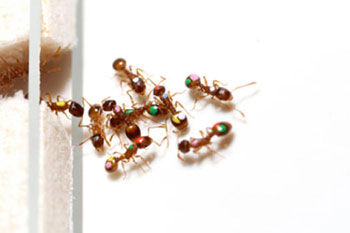All animals have to make decisions every day. Where will they live and what will they eat? How will they protect themselves? They often have to make these decisions as a group, too, turning what may seem like a simple choice into a far more nuanced process. So, how do animals know what’s best for their survival?
For the first time, Arizona State University researchers have discovered that at least in ants, animals can change their decision-making strategies based on experience. They can also use that experience to weigh different options.
The findings are featured today in the early online edition of the scientific journal Biology Letters, as well as in its Dec. 23 edition.
Co-authors Taka Sasaki and Stephen Pratt, both with ASU’s School of Life Sciences, have studied insect collectives, such as ants, for years. Sasaki, a postdoctoral research associate, specializes in adapting psychological theories and experiments that are designed for humans to ants, hoping to understand how the collective decision-making process arises out of individually ignorant ants.
“The interesting thing is we can make decisions and ants can make decisions — but ants do it collectively,” said Sasaki. “So how different are we from ant colonies؟”
To answer this question, Sasaki and Pratt gave a number of Temnothorax rugatulus ant colonies a series of choices between two nests with differing qualities. In one treatment, the entrances of the nests had varied sizes, and in the other, the exposure to light was manipulated. Since these ants prefer both a smaller entrance size and a lower level of light exposure, they had to prioritize.
“It’s kind of like a humans and buying a house,” said Pratt, an associate professor with the school. “There’s so many options to consider — the size, the number of rooms, the neighborhood, the price, if there’s a pool. The list goes on and on. And for the ants it’s similar, since they live in cavities that can be dark or light, big or small. With all of these things, just like with a human house, it’s very unlikely to find a home that has everything you want.”
Pratt continued to explain that because it is impossible to find the perfect habitat, ants make various tradeoffs for certain qualities, ordering them in a queue of most important aspects. But, when faced with a decision between two different homes, the ants displayed a previously unseen level of intelligence.
According to their data, the series of choices the ants faced caused them to re-prioritize their preferences based on the type of decision they faced. Ants that had to choose a nest based on light level prioritized light level over entrance size in the final choice. On the other hand, ants that had to choose a nest based on entrance size ranked light level lower in the later experiment.
This means that, like people, ants take the past into account when weighing options while making a choice. The difference is that ants somehow manage to do this as a colony without any dissent. While this research builds on groundwork previously laid down by Sasaki and Pratt, the newest experiments have already raised more questions.
“You have hundreds of these ants, and somehow they have to reach a consensus,” Pratt said. “How do they do it without anyone in charge to tell them what to do?”
Pratt likened individual ants to individual neurons in the human brain. Both play a key role in the decision-making process, but no one understands how every neuron influences a decision.
Sasaki and Pratt hope to delve deeper into the realm of ant behavior so that one day, they can understand how individual ants influence the colony. Their greater goal is to apply what they discover to help society better understand how humanity can make collective decisions with the same ease ants display.
“This helps us learn how collective decision-making works and how it’s different from individual decision-making,” said Pratt. “And ants aren’t the only animals that make collective decisions — humans do, too. So maybe we can gain some general insight.”
Source : Science Daily
H.SH

